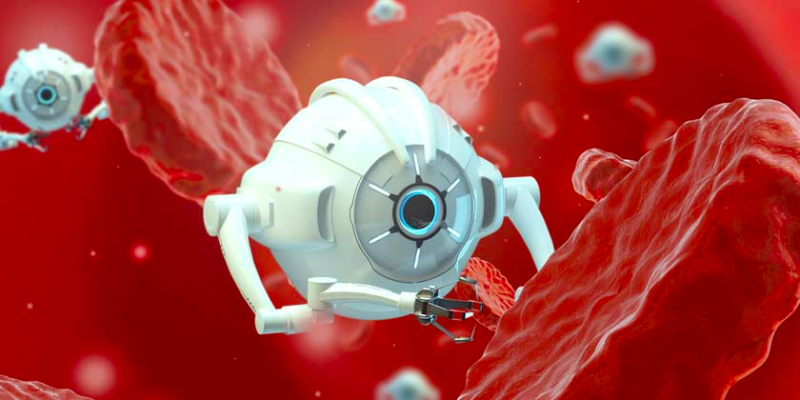The capability of actively controlled nanobots to disinfect dentinal tubules, which can be used during a typical root canal surgery, is being researched by the team at the Indian Institute of Science.

Numerous micro-organisms present in the dentinal tubules, which are part of the dentine tissue of human teeth, cause millions of root canal procedures to fail globally. The shape of the tubules is complicated and constrained, making the passive diffusion of antibacterial agents ineffective in existing methods.
It has been shown that magnetically activated nanobots can access tubular depths that conventional therapeutic approaches cannot.
Numerical calculations and subtle magnetic drive modifications enable both spatially controlled recovery from specified places and deep implantations of the nanobots that are isotopically dispersed throughout the dentine. The integration of a bactericidal treatment modality with nanobots is then shown, demonstrating the enormous potential of nanobots in dentistry and nanomedicine in general.
Ambarish Ghosh and his team at the IISc's Centre for Nanoscience and Engineering created nanobots that are small enough to fit through the dentinal tubules in order to reach the bacteria and kill them.
These nanobots can be incorporated during the root canal treatment and controlled externally, allowing the dentist precise control when disinfecting the affected tooth.
“Our research involves using remotely controlled nanorobots that can be driven using innocuous low-intensity magnetic fields,” explained Debayan Dasgupta, a Ph.D. student at the time of the research, “It is much more efficient at maneuvering in hard-to-reach anatomies and can be retrieved back, unprecedented for any contemporary drug delivery technology.”
Shanmukh Peddi, dental surgeon and co-author of this study, explains: “To increase the depth of penetration of drugs, various other modalities have been implemented such as lasers and ultrasounds, but as the energy decays quickly these methods are inefficient at deeper levels of drug tissue penetration. So, current methods cannot treat deep-seated bacterial colonies that persist over time and cause complications post-treatment.”
Freshly extracted teeth from orthodontic patients were used in the study, making it an in vitro study rather than a clinical trial, but the results are no less promising. As Dasgupta explained, “We demonstrated [an] established antibacterial efficacy of the nanorobots (swarm) against Enterococcus faecalis bacterium biofilms inside the human tooth, using the localized heat released from the nanobots through magnetic hyperthermia at tissues depths of 2000 microns, which is the highest depth achieved by any other contemporary market technology.”
Enterococcus faecalis is a priority bacteria according to the WHO because it can develop antibiotic resistance. Localized heat was used to kill these bacteria, thus eliminating the need for antibiotics.
The nanobots can also be recovered after use. According to Dasgupta, this trait is "unprecedented" since it allows them to be easily regulated to escape the dentinal tubules where they may be collected.
“[Our] next challenge involves organizing randomized controlled trials for in vivo animal studies,” said Peddi in an email, “and proving their efficacy in living systems, which will further pave the pathway for clinical translation. The startup is currently exploring other medical domains where this technology can be applied.”
Ghosh is also hopeful his team’s work can be the start of a generalized approach to “nanosurgery”, not just in the dental field. “We show nanobots [can be] manipulated inside human organs and fight deadly bacteria,” he said, adding that their work is “bringing into reality one of the long-standing goals of modern nanotechnology.”
Source: A. Ghosh et al., Mobile Nanobots for Prevention of Root Canal Treatment Failure, Advanced Healthcare Materials (2022). DOI: 10.1002/adhm.202200232




















Comments